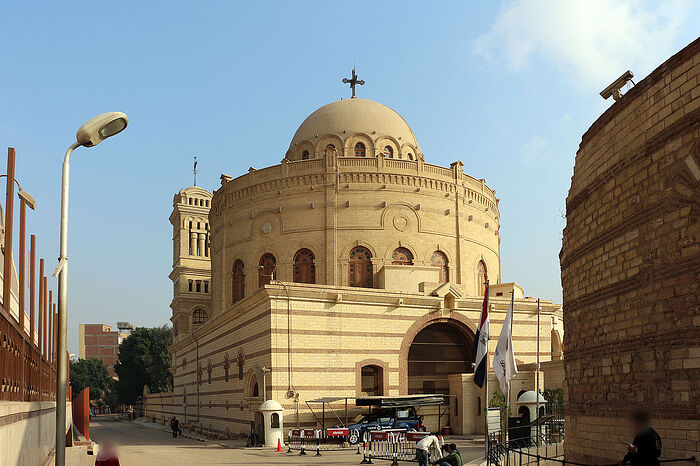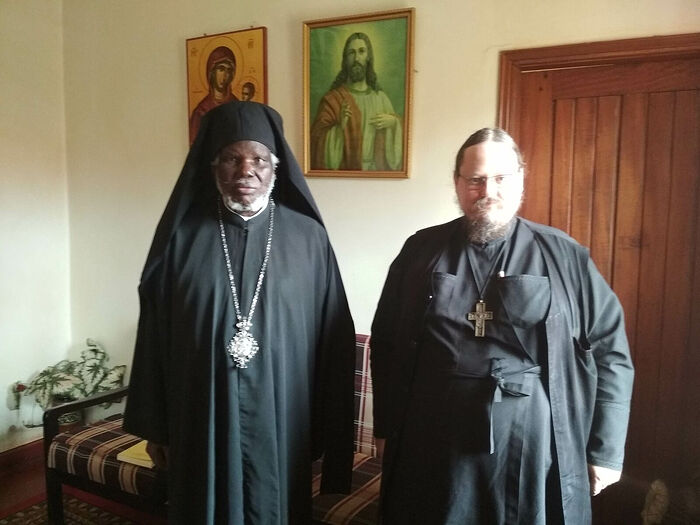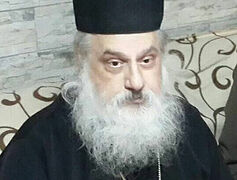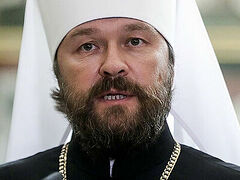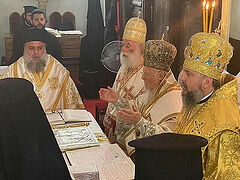At the recent Synod of the Russian Orthodox Church, which took place on September 23–24, 2021, the “consequences of the Primate of the Alexandria Patriarchate’s concelebrating with the head of a schismatic structure active in Ukraine” (journal No. 61) were discussed. The resolutions passed were interpreted by many as saying that our Church will very soon receive into its jurisdiction those African priests of the Alexandria Patriarchate who have addressed the Moscow Patriarchate with a request to be received under its omophorion, after Patriarch Theodoros of Alexandria recognized the schismatic OCU on November 8, 2019.
There has already been a move toward accepting African clergy
And although obviously, a final decision will be passed only at the next Synod session, it can already be said that a definite move toward a positive decision to accept the African clergy has been made.
Many in Russia rejoiced at this news, but there are also those who are troubled about it. In part, they have questions about whether this will be according to the canons, and will it not turn out to be an unjustified invasion into the canonical territory of another Local Church. In this article, I would like to provide an answer to these concerns.
Basically, there are two questions here:
-
Can the Russian Orthodox Church create its own jurisdiction in Africa when the Patriarch of Alexandria considers Africa its canonical territory?
-
Can the Russian Orthodox Church receive, under the current historical circumstances, clergy of the Alexandrian Patriarchate without them having a document of release from their hierarchs?
I will say up front that I would personally answer both questions in the positive, and will present below what I base my answer on.
Let’s begin with the first question. Right up to the beginning of the twentieth century, the title of the Alexandria Patriarch sounded like this: “Pope and Patriarch of the City of Alexandria, Libya, Pentapolis, Ethiopia, and all Egypt”. This is the canonical territory that is traditionally and generally accepted in Orthodoxy of the Alexandria Patriarchate. Egypt, Libya, Ethiopia—and that’s all. And according to the sixth canon of the First Ecumenical Council and the second canon of the Second Ecumenical Council, the authority of the Alexandrian bishop extended to no more than “all Egypt”. This is connected with the fact that historically on the African continent there were several Local Churches: the Alexandrian, Carthaginian, and Ethiopian Churches. And only after the Ethiopian Church fell into Monophosytism, and the Carthaginian Church disappeared under the Arab attacks, the Alexandrian Church remained the only Orthodox Church in Africa—claiming only certain of its northern regions as its canonical territory.
Only Meletius (Metaksakis) of sad memory, who occupied the Alexandrian see from 1926 to 1935, added to his title the words, “and All Africa”. This serious expansion of the Alexandrian Patriarchate’s jurisdiction was not the result of Pan-Orthodox discussion or any conciliar decision, but only the unilateral decision of one ambiguous historical figure. Moreover, this claim remained for a long time only on paper, and only decades later, in the second half of the twentieth century, did the Greeks begin missionary work amongst the native population of a number of African nations (in a number of countries in the African continent there is still not a single parish of the Alexandria Church).
It’s understandable that in light of the dramatic events of the twentieth century, other Local Churches had no time to discuss the jurisdiction of Africa, never mind engage in any conflicts over it. Although, I have heard that the Constantinople Patriarch recognized the Alexandrian Church’s jurisdiction over all Africa only in the 1970s in exchange for the transfer of the Alexandrian Exarchate in America to the jurisdiction of Constantinople.
Naturally, none of the above were what moved the Russian Orthodox Church to open its own jurisdiction in Africa; we have only provided a brief historical excursus. Nevertheless, it is appropriate to remember all this because now certain Greek hierarchs of the Alexandrian Patriarchate are telling their clergy that supposedly Africa always belonged to the Alexandrian Church, and only it can do anything there. This is simply not true.
But the reason for the Russian Orthodox Church’s actions is the above-mentioned recognition by Alexandrian Patriarch of the OCU on November 8, 2019. Here it is also appropriate to mention that there were already Russian parishes in a number of African countries. The majority of their parishioners were people from the countries of the Russian Orthodox Church’s canonical responsibility; the churches were built by Russians, and Russian priests have been serving in them—but at the Liturgy they commemorated the Patriarch of Alexandria and the local Greek hierarchs in their jurisdiction.
There are Russian Orthodox Christians in Africa who refuse to go to parishes of the Alexandria Church
The treacherous act of Patriarch Theodoros, who earlier supported the canonical Ukrainian Orthodox Church, has placed the Russian Church in a complicated situation. It has on a number of occasions warned its flock against communion with schismatics, and now there was a situation in which the laity it baptized and the clergy it sent to Africa could be entering into communion with a schism through prayer and Eucharistic Communion with the Patriarch of Alexandria, who has accepted this schismatic organization as if it were a Church. And this is not an ephemeral problem; I personally know Russian Orthodox Christians living in Africa who, after Patriarch Theodoros’s above-mentioned act, refused to attend the parishes of the Alexandrian Church.
And so, in order to protect these people from communion with schismatics, the Synod of the Russian Orthodox Church, on December 26, 2019, having recognized the impossibility of commemorating Patriarch Theodoros of Alexandria in the Dyptichs, or of any prayer and Eucharistic communion with him, resolved to change the status of the “Representation of the Patriarch of Moscow and All Russia under the Patriarch of Alexandria” to the parish of the Russian Orthodox Church in Cairo; to take the parishes of the Russian Orthodox Church located on the African Continent out of the jurisdiction of the Alexandrian Patriarchate, and give them stavropegic status” (Journal No. 151).
This marked the official opening of the jurisdiction of the Russian Orthodox Church in Africa. It has de jure and de facto existed for nearly two years in this form. Notably, at the time it did not evoke the perplexed questions that have arisen now. Practically all of the given resolutions were accepted as a matter of course.
If we do this for Russians living in Africa, then why not for the Africans?
Meanwhile, scores of requests began to be sent to His Holiness the Patriarch of Moscow from clergy of the Alexandrian Patriarchate likewise expressing their desire to protect themselves and their parishioners from communion with schismatics. And here the question arises: If we have done this for Russians living in Africa, then what why should we refuse analogous requests from Africans? Because of the color of their skin? This would be racism, and the Russian Orthodox Church is against racism in principle.
There is no obstacle whatsoever to receiving African laity into the Russian Orthodox Church. But when we are talking about clergy, then questions might arise as to just how much a clergyman depends on his ruling hierarch. And in ordinary situations, without a release document from his hierarch, a clergyman cannot transfer anywhere.
But what if a hierarch has entered into communion with schismatics? This situation is unusual, but this is precisely what has happened in Africa. I remind you that the holy fathers unanimously teach that it is impossible to be saved in schism, and that schism is apostasy from the Church and a path to destruction.
“Do not be deceived, my brothers! Whoever follows after schism will not inherit the Divine Kingdom”, wrote Holy Hieromartyr Ignatius the God-Bearer.1
And Blessed Augustine said:
“We believe in the holy catholic Church. However, heretics and schismatics also call their communities churches. But in their false thoughts about God, heretics distort the very faith; and with their unlawful divisions, schismatics depart from brotherly love, even though they believe in the same things as we do. Therefore, neither heretics nor schismatics belong to the Ecumenical Church, which loves God, nor do schismatics belong to it.”2
And Holy Hieromartyr Hilarion (Troitsky) wrote:
“We know and are convinced that apostasy from the Church, be it into schism, heresy, or sectarianism, is complete destruction and spiritual death. If Christ created the Church, and the Church is His body, then to tear oneself away from His Body means death.”3
Thus, schism is by no means a trifle or an administrative disagreement, as Patriarch Theodoros is now trying to present it to the African clergy. Schism is a straight path to hell. And if we go to the Church canons, then we see that the second canon of the Council of Antioch says:
“It is not allowable to have communion with the excommunicated, or to enter their houses and pray with those who are outside of ecclesiastical communion: Those who have alienated themselves from the congregation of the one Church must not be allowed into another church. If any of the bishops, presbyters, deacons, or any other clergy are found to be communing with the excommunicated, they themselves shall be outside of church communion.”
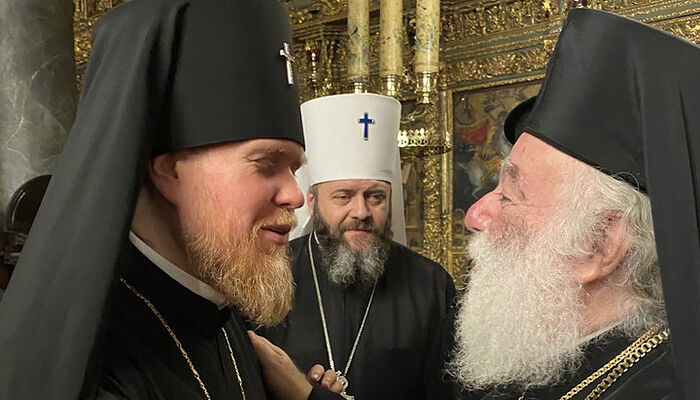 Evstraty Zorya and Patriarch Theodoros. Photo: Romfea.
Evstraty Zorya and Patriarch Theodoros. Photo: Romfea.
According to this canon, entering into communion with schismatics makes those who do so excommunicated from ecclesiastical communion; i.e., they turn out to be in the same situation with regard to the Church as those schismatics with whom they entered into communion. We are speaking, I emphasize, not about any canonical violation, but about something that leads a person out of the Church and deprives him of hope for salvation—and that applies only to heresy and schism.
In the opinion of those who are asking the questions discussed here, a clergyman can only break from his bishop due to that bishop’s heresy. And even in the case of a threatening schism, he supposedly should not leave him. However, it would be difficult for me to call such a position something in accordance with Orthodox ecclesiology. For then we would have laity who, according to Patristic teaching, should not follow after a priest who has gone into schism, while a priest should follow his hierarch into schism? Such absurdity could in no way be called a “canonical approach”. I remind you that in the words of St. John Chrysostom, “Producing a division in the Church is no less of an evil than falling into heresy… the sin of schism cannot be cleansed away even by a martyr’s blood.”4
There is testimony that equates heretics with schismatics in canon six of the Second Ecumenical Council, where it says:
“And by heretics we mean both those who were aforetime cast out, and those… professing to hold the true faith who have separated from our canonical bishops, and set up conventicles in opposition [to them].”
The idea that supposedly a clergyman should follow after his bishop into schism contradicts the above-cited second canon of the Council of Antioch. In fulfillment of this canon our Church has broken Eucharistic communion with the Patriarch of Alexandria. Here we are not talking about a personal violation or transgression by a particular hierarch, but of the official position of a Church’s Primate. Patriarch Theodoros announced his recognition of a schismatic structure and openly entered into communion and concelebration with schismatics.
The Synod has testified that there is a schism between the Churches
The Synod of the Russian Orthodox Church on September 24, 2021 resolved that by these actions, he “is further deepening the schism between our Churches”. I remind you that the Synod’s status is that of a small council of bishops. That is, it has given conciliar testimony that between our Church and the Church of Alexandria a schism exists. And if we have recognized this, then how could we argue in favor of a refusal of the clergy who wish to guard themselves from schism?
According to the second canon of the Council of Antioch, the clergy under Patriarch Theodoros should be outside of communion with such a primate. However, according to the canons a priest without a bishop cannot serve. If a bishop were to be found in the Alexandrian Patriarchate who would oppose the Patriarch’s actions of entering into communion with schismatics, then those clergy should have appealed to that bishop.
But as our Synod noted in its resolution, “At the current time, none of the hierarchs of the Alexandrian Orthodox Church have refused to agree with the actions of Patriarch Theodoros in his support of schism in Ukraine.” Already after the Synod decision, Metropolitan Panteleimon (Lampadirios) of Andinois expressed his position:
“The decision of the Ecumenical and Alexandrian Patriarchates in connection with recognition of autocephaly of the ‘Orthodox church of Ukraine’ is uncanonical and contradicts the sacred canons of the Orthodox Church. Unfortunately, this decision has created more problems not only in Ukraine, but throughout the Orthodox world, especially in Africa… As for the priests of Tanzania who wish to join the Russian Orthodox Church, this is a matter that they must decide themselves. The only way to overcome this conflict is through true repentance on the part of Patriarchs Bartholomew and Theodoros, and Archbishop Hieronymos of Athens. They must withdraw their uncanonical decisions and restore peace and unity in the Church. Otherwise, they will encounter the Terrible Judgment of our Lord and Savior Jesus Christ, because this has become a temptation for the faithful.”5
The Metropolitan demanded that the Tanzanian priest sign a document in support of Patriarch Theodoros’s actions
This bold statement by a hierarch of the Alexandrian Orthodox Church deserves respect; however, Met. Panteleimon is in retirement and is not a ruling hierarch. Neither does he take any action to gather African bishops around himself. If we were to talk about ruling hierarchs, then none of them has come out with such a statement. Although, as one example—when I met in early 2020 with the recently reposed Metropolitan Jonah (Luanga) of Uganda, in personal conversation he admitted to me that he categorically disapproved of Patriarch Theodoros’s actions on the Ukrainian question. But he did not make his position public, just like certain other hierarchs of the Alexandria Church who are wary of losing financial assistance from Greece due to their opposing opinion. Moreover, other hierarchs have distinguished themselves as fierce supporters of recognizing the Ukrainian schismatics,6 and have likewise begun to persecute and harass their clergy who signed the “Open Letter of the Priests of the Alexandrian Patriarchate”.7 Fr. David Lakvo was dismissed from his position as rector and as director of the Orthodox school, expelled with disgrace, and left without any means of livelihood. Fr. Ambrose Chavalu and a number of other Tanzanian clergy were “called to the carpet” by their Greek metropolitan, who demanded that they sign a document of approval for Patriarch Theodoros’s recognition of the OCU. When these clergymen refused, they were also kicked out of their churches and removed from their other positions. Moreover, threats were voiced they would be further persecuted even to the point of physical retribution.
Could we really refuse to accept these unfortunate African fathers who have suffered because they expressed their support for our Church?
I am writing this not to condemn the hierarchs of the Alexandrian Church, but only in order to describe the situation in which these African priests have now found themselves. Of course, not all of them are aware of the tragic events in Ukrainian Orthodox society; Ukraine is very far away from Africa, and not every local priest has access to the internet. Nevertheless, there are no few fathers who know what is going on, and want to guard themselves and their flocks from communion with schismatics.
What should they do?
Inasmuch as a ruling hierarch who categorically rejects the path of schism has not been found in the Church of Alexandria, then the only remaining possibility for these clergymen is to turn to a bishop of another canonical Church that has guarded itself from entering into schism.
Therefore, in light of the Orthodox teaching on the sin of schism and the second canon of the Council of Antioch (just like the tenth, eleventh, and twelfth apostolic canons) the acceptance of African clergymen within the present situation into the Russian Church (or any other Church that is not in communion with schismatics) is both possible and right. Perhaps as a temporary measure—until the Alexandrian Church is freed from communion with schismatics; or perhaps permanently, within the boundaries of the jurisdiction of the Russian Orthodox Church in Africa that was already established two years ago. This will soon be reviewed and decided at a Synod meeting, and then also at the Council of Bishops.
However, I repeat that the idea that supposedly, according to the canons, a clergymen must follow his primate into schism sounds just as crazy as the idea that one has to follow him into heresy “out of obedience”.
No one can criticize the Russian Orthodox Church for having little patience
And although now many Greek speakers connected with the Alexandrian Church are firing out wrathful diatribes at the Russian Church, trying to frame it as an aggressor, it is in fact—as is the whole of Orthodoxy—a victim of Constantinople Patriarch Bartholomew’s recklessness and that of the primates of nearly all the Greek Churches who support his lawless actions. No one can criticize the Russian Orthodox Church for having too little patience or too few attempts at dialogue. But this Christian patience and humility was interpreted by the authors of this confusion as a sign of weakness, and they continued to deepen the schism. It is only left to the Russian Church to protect its flock from the deadly infection of schism and to stretch out a helping hand to those who want to keep themselves and their parishioners out of danger. This has already happened with the Russian exarchate and a number of individual clergymen of the Constantinople Patriarchate.
Now it’s Africa’s turn.
The authors of this ecclesiastical confusion have only themselves to blame. Moreover, the ideological basis of the Constantinople Patriarchate’s schismatic actions is in fact its acceptance of the heresy of new papsim,8 and the premises for the current movement of African priests are also the specific actions of Greek bishops in Africa;9 but I have already discussed these themes in other articles.
As for the questions cited at the beginning of this article, I hope that I have managed to explain why I personally answer them in the positive.

